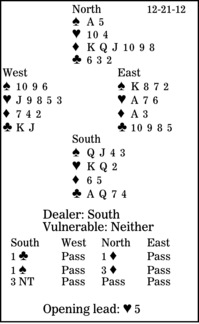Bridge column, December 21: How can you stop south from winning?

The winning defensive play in this deal is the first cousin of the Deschapelles Coup highlighted yesterday. How can East defeat three no-trump after winning West's heart-five lead with his ace?
Discuss South's rebid with your partner. One spade has been traditional for decades, but there is a case (not without risk) for rebidding one no-trump, which accurately shows distribution and high-card content. Bid no-trump with balanced hands and suits with unbalanced hands.
North's three-diamond rebid is game-invitational.
There is a standard policy in no-trump to return your partner's suit. Here, though, that works very badly. South wins the trick and drives out East's diamond ace, taking at least nine tricks via one spade, two hearts, five diamonds and one club.
East should get that dummy entry off the board at trick two by shifting to the spade king.
South wins with dummy's ace and plays on diamonds. East takes the second round and reverts to hearts to defeat the contract.
This is called a Merrimac Coup, named after the American steamship Merrimac, which was sunk in Santiago de Cuba in 1898 during the Spanish-American War in an attempt to bottle up the Spanish fleet.
Finally, note that the coup works even if West had started with king-jack-fifth of hearts.
** ** **
COPYRIGHT: 2012, UNITED FEATURE SYNDICATE
DISTRIBUTED BY UNIVERSAL UCLICK FOR UFS

